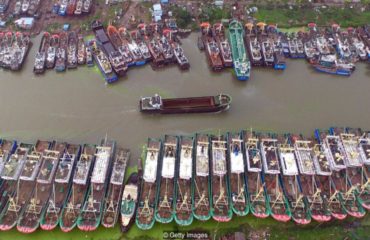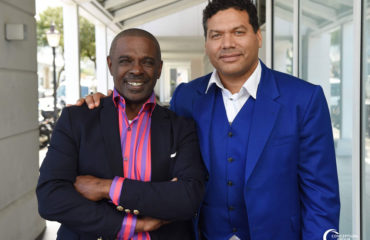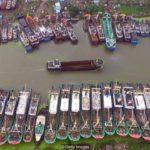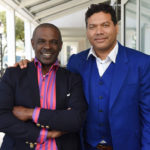Old Pals Reconnect Through Service Mission
In this week’s Washington Post Magazine, two childhood friends reunite while preparing for a humanitarian mission to Sudan. Journeymen David Matthews and Stefan Templeton tell their story.
MICHEL MARTIN, host:
I’m Michel Martin, and this is Tell Me More from NPR News. Coming up, how the Obama nation is using technology and hoping to bridge the digital divide.
But first, we’re going to take a look into the pages of the Washington Post Magazine, where we go just about every week to find interesting stories about the way we live now. This week, a story that takes us from the West Side of Baltimore to war-torn Sudan. David Matthews and Stefan Templeton were childhood friends in West Baltimore until life took them in different directions. Recently, they reconnected while Stefan was preparing for a humanitarian mission to Sudan. He invited David, a freelance writer, to tag along, and he writes about the experience in this week’s edition of the magazine. They’re with us now. Welcome to you both.
Mr. DAVID MATTHEWS (Freelance Writer): Thanks.
Mr. STEFAN TEMPLETON: Well, thank you.
MARTIN: Stefan, humanitarian mission doesn’t quite capture what it is that you do. What is it that you do?
Mr. TEMPLETON: You know, to answer to that question, I’d say I try to meet the needs as I see them in the place that I am at the time.
MARTIN: Which means?
Mr. TEMPLETON: Which means the kind of thing that’s going on in Sudan is fairly typical of conflicts of water and resources. The only difference is that I found people that were pretty marginalized and were – seemed to be forgotten by the media. They seemed to be forgotten by the rest of the world. Even the U.S. policy, although it has been very supportive of Southern Sudan, hasn’t really been giving them, as I see it, the kind of suport they really need. And they’re in a conflict right now that affects the local population. So I’m trying the system in every way I can possible.
MARTIN: Your core expertise is?
Mr. TEMPLETON: Is water, essentially. And that implies with the conflict over water. You know, a lot of people forgot that people die from lack of water but people also kill for access to water.
MARTIN: And you were getting ready to make a trip to Sudan when you and David reconnected. Tell us about your mission.
Mr. TEMPLETON: You know, I felt that – this is my third mission to this particular area, which is Abyei, which is a community that has suffered a massive amount of depopulation over 20 years of war between the north and south Sudan. When political Islam became the governing system in Sudan under the government of Numeri and then Omar al-Bashir, the situation there is pretty complex.
The fact of the matter is that these are some of the poorest people in the world, yet they’re sitting on one of the largest oil reserves in the world. The oil is laying on top of a pocket of water. The aquifer basically is carrying very large deposit of crude oil, and that’s what really this conflict is about. It’s about oil.
MARTIN: David, why did you want to go?
Mr. MATTHEWS: The short answer is I’m writing a book about Stefan and his life, which has taken many terms to get to the place he is now. And I wanted to go because it was an opportunity to actually see what he does because it was a really foreign concept to me. You know, I’m double Starbucks venti latte, and I don’t really recycle, and I leave the water on when I brush my teeth. So that was important to me mainly for the book, so that I could imbue it with sort of a sense of I was there, and this is what the normal, everyday guy who doesn’t leave his living room – you know, I’m their translator.
MARTIN: But speaking of translating, what is it that you think you learned, not just from this trip but this whole interest in Stefan and his work? I think there are a number of revelations just in this piece alone about the way people who do this kind of work have to operate, the conditions that they’re operating in, and the fact that, you know, they can’t necessarily come off like Mother Theresa and get something done. So tell me about what were the revelations for you in going along on this journey?
Mr. MATTHEWS: Well, the revelations for me, who’s someone who makes it a point of not getting involved in anything larger than myself as many Westerners do, was that there is a whole NGO and humanitarian system out there. And when we see, you know, ads on television or we see these fundraising things, we assume that this is all really effective. And in many cases, it’s not. You know, when you go to somewhere like Abyei and you see all of the really well-meaning and in some cases really effective aid organizations, but you get there and you see how reluctant they are to actually take a side.
Now, a lot of that is for good reasons, so that they can be trusted by both sides. But a lot of that hamstrings their abilities to be effective. For instance, in Abyei, you know, there’s definitely a good guy and a bad guy in this scenario.
MARTIN: David, you don’t shy away from some of the criticism of Stefan that – how can we put this since he’s sitting here in front of me? – but ego plays a bit of a role in his choice of employment and in the way he goes about his business. In fact, you quote a person who is the head of an organization on whose behalf he was acting at one point, and she says, Stefan Templeton’s no hero. He’s a fake. All he’s interested in is glorifying himself. Why did you include that? And Stefan, how do you feel about that…
Mr. MATTHEWS: I just want to point out…
MARTIN: Having your business out in the street like that?
Mr. MATTHEWS: Who goes first?
MARTIN: David, you.
Mr. TEMPLETON: You go ahead.
Mr. MATTHEWS: OK. I included that because, you know, I’ve traveled over the last year and a half or two. I’ve traveled around with Stefan all over the world visiting lots of the places where he got his education, both on the record and off, and just literally being a fly on the wall while watching him go about his business. And it was impossible for me to find anyone who had anything bad to say about Stefan, especially professionally. And when I was talking to my editors at the Washington Post, they’re like, it’s not that we don’t necessarily believe you but we can’t write a hagiography. We can’t write about this guy as though he’s Mother Theresa. Someone somewhere must have a beef with him.
So, being a good snoop, I found the few people at Paramedics For Children who did have a beef with him. But interestingly enough, I’ll point out for anyone who reads the piece, following their disavow of what they thought Stefan’s sort of lack of follow-through was – I talk about what he actually wound up doing. So even though Stefan wasn’t able to make Paramedics For Children happy, the mission that he was on while he – you know, while they thought he was letting them down – was every bit as important and every bit as heroic. And the people that he wound up working with, you know, wrote to me and said that this was the most heroic guy they’d ever seen.
MARTIN: David, what did Stefan wind up doing in Abyei, on the mission that you went on, on the trip you went on? What he wind up accomplishing?
Mr. MATTHEWS: The most important thing that he wound up accomplishing was he was trying to find an evacuation corridor for the people of Abyei who were slowly starting to come back because no one had really taken the time to map all the water sources along this route from Abyei south. And Stefan could tell that war was coming up. And if you read the piece, it talks a lot about sort of the political exigencies of there’s going to be a referendum, and the south is going to secede soon, and I won’t get into the whole history thing, but by 2009 and 2011, things are going to get hot again in Abyei.
And Stefan was weary that no one in the West was really taking that seriously and that Western aid organizations tend to show up after the fact. You know, oh, wasn’t it a shame about Rwanda? And you know, you turn around, it’s like, wow, a million people have died in Sudan. How come we didn’t know about this? So he plotted an evacuation route based on water sources.
So say they are 10 wells spread out among 10 villages, he divides the map so that each village would know if fighting broke out and they had to retreat south where the next water point was because more people die from dehydration than die from ever actually being involved in direct conflict.
MARTIN: And it’s interesting to point out that in this country, you know, we have had recently experience with mass evacuations, and this is something that officials in this country are trying to persuade people to think about and don’t think about, which is, where’s your water? What are you going to do? Where are you going to meet?
What would you want people to know about you, Stefan? What would you want people to draw from this?
Mr. TEMPLETON: You know, I’m not used – I’ve been trying to stay off the grid for a long time, and this is – you know, I’m much more comfortable out there than here, to tell you the truth. I would like people to consider President Obama’s recent call into service in the light of their own lives. You know, I would like people to look a bit further than their jobs, their cubicles, their workplaces and their lives, particularly in this current climate – economic climate, which seems to be downturning and then worsening.
Consider the effect that your actions may have on others, and consider the effects of that towards yourself, the beneficial effects of service. You know, consider service and consider embracing this calling. And you know, maybe my example is extreme to some, but you can affect a change if you really care to take the risk.
MARTIN: Dave, what would you like people to draw from your piece?
Mr. MATTHEWS: I think I’d like people to draw from my piece that just because you’re not familiar with the world doesn’t mean that it doesn’t exist. And I think that in terms of, you know, defining a new generation of – I hate to use the word hero because it does sound cheesy, but there are people out there – Stefan just being one of the many, many, many people – who actually at great personal risk live lives that we can’t imagine. And those kind of lives, I think, can be really instructive and inspirational.
MARTIN: Childhood friends David Matthews and Stefan Templeton. David writes about Stefan’s humanitarian work, to put it very mildly, and their trip to Sudan in this week’s Washington Post Magazine. If you want to read the piece in its entirety, it’s called “A Man with a Mission.” And we’ll have a link on our Web site, npr.org/tellmemore. David was in our New York bureau, and Stefan was kind enough to join us here in Washington, D.C. My thanks to each of you.
Mr. TEMPLETON: Thanks very much.
Mr. MATTHEWS: Thanks.
Copyright © 2009 NPR. All rights reserved. Visit our website terms of use and permissions pages at www.npr.org for further information.
NPR transcripts are created on a rush deadline by Verb8tm, Inc., an NPR contractor, and produced using a proprietary transcription process developed with NPR. This text may not be in its final form and may be updated or revised in the future. Accuracy and availability may vary. The authoritative record of NPR’s programming is the audio record.
Web Resources WP: ‘A Man With A Mission’






